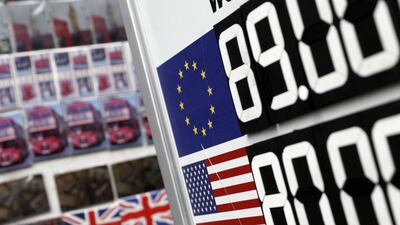Around 100,000 Britons living in the UAE have a front-row seat from which to view the early effects of Brexit on their homeland.
Many will be capitalising on sterling’s current weakness to help fund mortgages at home or pay for fees and accommodation for children living in the UK. Some will have laughed at reports of the UK’s temporary Marmite scarcity as food retailers did battle with wholesalers over the latter’s proposed post-sterling crash price increases.
All of them should be aware, however, that Brexit is fundamentally changing the country to which they will one day return.
The speech given at the recent Conservative party conference by the new prime minister, Theresa May, revealed a profound shift in political and social outlook. There was lots of “dog whistle” messaging about immigration and nationalism. A promise of a more interventionist government. Lots of insults directed at so-called moneyed, metropolitan elites and, in a final, populist attempt to side with the grass roots against globalisation, an observation that “if you believe you’re a citizen of the world, you’re a citizen of nowhere”.
Wasn’t Britain (or at least its economic engine room, London and the south-east) open to the world until a few months ago, a beacon to foreign nationals employed in banking and finance, home to inward investment wafted on the wings of light-touch regulation?
Did Britain not see itself, in the words of the foreign secretary Boris Johnson, as a “soft power superpower” with a massive global cultural and diplomatic imprint? Was it not a keystone of Britain’s economic policy that its enormous trade gap could always be bridged by foreign investment, drawn like a moth to a flame by its status as an English-speaking gateway to a European market of more than half a billion people?
All of you Brits in the UAE, enjoying the sun far from home, should understand that in its characteristically restrained and bashful way, the UK is having a Trump-lite moment. Britain's leaders, reading the political mood, are more isolationist in outlook, more suspicious of foreign influence and of immigrants and less inclined to join in the globalisation game (as if not playing were actually an option here).
Politicians leading the Brexit charge appear vague on plans for new trading arrangements, claiming that those with doubts over – or simple curiosity about – such arrangements are defying the sovereign will of the people.
The shrillness of the pro-Brexit media, now that initially robust economic indicators have given way to a fast-devaluing currency, is intensifying. Pressure to subject the Brexit process to parliamentary scrutiny is being met by governmental obstructiveness, even though one of the oft-stated aims of leaving the European Union was to return sovereignty to that same parliament.
In the end the process will be decided not by the UK, but by the remaining EU member states, whose system of governance, and whose economic and social policies, have for the past months been the subject of intense ridicule by Brexiteers. And it should be remembered that any final settlement with the EU is subject to veto by these member states. And member states, especially those in central Europe, have been clear that agreement on any enhanced trade deal must be contingent on free movement of European citizens.
Much has been said about a high-level decision being made for a so-called “hard Brexit” (summary separation from the EU and the single market) over a “soft Brexit” (a more nuanced settlement in which the UK retains single market access in return for continuing contributions and freedom of movement, à la Switzerland).
The truth is that hard Brexit has always been the only option. Doing away with freedom of movement and being seen to “control” immigration has become the touchstone of political legitimacy for the government and also for the far left, which now enjoys so much influence in the opposition Labour Party. As Donald Tusk, president of the European Council, said last week, it is “hard Brexit” or no Brexit at all.
It remains to be seen just how profound an effect this has on the UK economy, but time is against Britain. The UK is looking at an Article 50 declaration by next March and thereafter it has two years in which to negotiate its way out of more than 40 years of legal and diplomatic convention and set up revised trading arrangements.
Add into this the fact that big foreign investors such as Nissan and Sumitomo operate according to investment planning cycles that will demand clarity ahead of any date on which the UK can hope to produce its post-Brexit economic template.
At what stage might they decide to err on the side of caution and invest elsewhere?
Until all this plays out, my advice to all you Brits in the UAE is to capitalise on your front row seat for now and keep paying down the mortgage.
Martin Newland is a former editor in chief of The National

